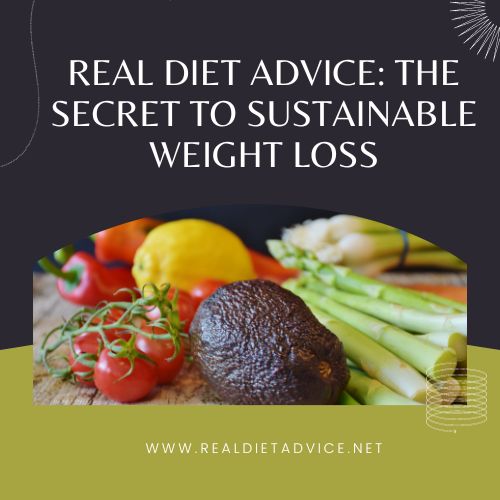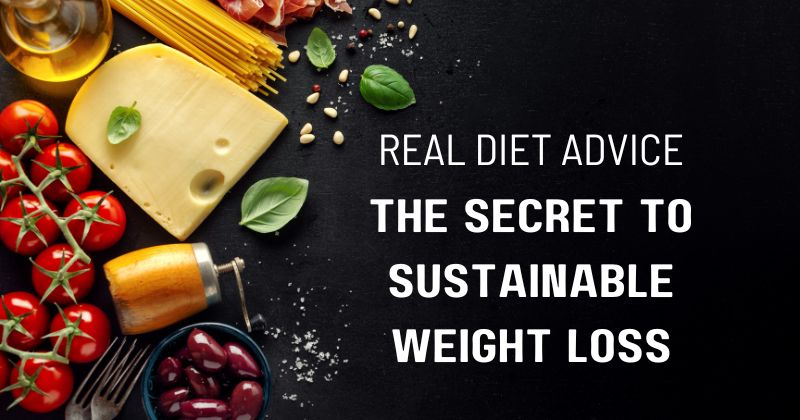Exploring the role of real diet advice in achieving sustainable weight loss and overall health improvement.
Weight loss has become a billion-dollar industry, with companies offering quick-fix solutions and miracle diet plans. However, the problem with these approaches is they often lead to temporary weight loss, followed by rapid weight regain. This yo-yo effect can be disheartening and harmful to your health. In contrast, the secret to sustainable weight loss lies not in fad diets but in making long-term lifestyle changes. This is where real diet advice comes in.
Real Diet Advice
Real diet advice focuses on sustainable weight loss, which is achieved through lifestyle changes rather than restrictive diets. It’s about understanding the basics of a balanced diet, debunking common diet myths, and incorporating physical activity into your routine. It also emphasizes the importance of mental health in weight loss journey.
Eating healthy doesn’t have to be boring or tasteless. Real diet advice includes tips on how to make nutritious meals more interesting and flavorful. For example, healthy whole grains can be spiced up with tasty herbs, spices, and vegetables. You can also add lean proteins such as fish and chicken to salads or stir-fries for a delicious meal. There

Understanding the Basics of a Balanced Diet
A balanced diet is composed of macronutrients (carbohydrates, proteins, and fats), micronutrients (vitamins and minerals), and fiber.
Carbohydrates** provide the body with energy,
Proteins** are essential for growth and repair, and
Fats** are necessary for brain function and hormone production.
Vitamins and minerals are required in small quantities but play a crucial role in various bodily functions. Lastly, fiber aids in digestion and keeps you feeling full, thereby preventing overeating.
Debunking Common Diet Myths
Myth 1: Extreme calorie restriction leads to long-term weight loss.
Reality: While calorie restriction can lead to short-term weight loss, it’s not sustainable in the long run and can lead to nutrient deficiencies.
Myth 2: All fats are bad.
Reality: Not all fats are created equal. Unsaturated fats found in avocados, nuts, and olive oil are beneficial for heart health.
Myth 3: Carbs make you fat.
Reality: It’s the type and quantity of carbs that matter. Whole grains, fruits, and vegetables are good sources of carbs.
Nutrition and Weight Loss
The relationship between nutrition and weight loss can be simplified as “calories in vs calories out.” To lose weight, you need to burn more calories than you consume. However, the quality of calories matters too. Processed foods, while high in calories, lack essential nutrients and can lead to weight gain.
The key to successful weight loss lies in eating healthy, nutrient-dense foods such as lean meat, fish, whole grains, low-fat dairy products, fruits and vegetables. It’s also important to incorporate physical activity into your daily routine. This will not only help you lose weight but also improve your overall health. Lastly, don’t forget to enjoy life and find balance! Exercising and eating healthy should not become a source of stress or anxiety. Remember to maintain a positive outlook and be mindful of the beauty in life.
Practical Tips for a Balanced Diet
To implement a balanced diet:
Learn to read and understand food labels.
Practice portion control.
Make healthy food substitutions, such as whole grains instead of refined grains.
Physical Activity and Weight Loss
Exercise plays a crucial role in sustainable weight loss. It helps burn calories, increases metabolism, and improves overall health. Different types of physical activity offer different benefits:
Cardio** exercises like running and cycling are great for burning calories.
Strength training** helps build muscle mass, which boosts metabolism.
Flexibility exercises** like yoga and stretching improve balance and posture.
Exercise Guidelines for Weight Loss
The American Heart Association has set forth some guidelines to help individuals achieve their weight loss goals through exercise. These guidelines can be a cornerstone in your journey toward a healthier lifestyle.
Exercise Time and Intensity Table
Here’s a table that summarizes the recommended exercise time and intensity:
| Exercise Time | Intensity |
| At least 150 minutes per week | Moderate-intensity |
| 75 minutes per week | High-intensity |
Daily Physical Activity Ideas
In addition to these guidelines, incorporating physical activity into your daily routine can make a significant difference. Here are some ideas to get you started:
- Take the Stairs: Opt for the stairs instead of the elevator whenever possible.
- Walking Breaks: Incorporate short walking breaks into your workday to get your body moving.
- Morning or Evening Yoga: Start or end your day with a yoga or stretching session to improve flexibility and reduce stress.
- Cardio Activities: Go for a run, swim, or bike ride to get your heart rate up.
- Try Something New: Consider taking up a new physical activity like dancing or martial arts to keep things exciting.
By adhering to these exercise guidelines and incorporating practical tips into daily life, individuals can develop healthy dietary habits that will lead to sustainable
Mental Health and Weight Loss
The psychological aspect of weight loss is often overlooked. Emotional eating, stress, and lack of motivation can hinder weight loss efforts. Strategies such as mindful eating, stress management, and seeking support can be helpful.
**Mindful eating: ** Mindful eating is focusing on the present moment while consuming food. This can help individuals avoid overeating and make healthier choices.
**Stress management: ** Chronic stress can lead to unhealthy behaviors such as increased snacking or skipping meals. Incorporating stress management techniques like deep breathing, journaling, or yoga into daily life can help to reduce stress and emotional eating.
**Seeking support: ** Joining a weight loss program or online community can provide motivation and structure when trying to lose weight. Having the support of peers and professionals can make dieting easier. Additionally, talking to a mental health professional about any underlying issues may be beneficial for long-term success.
Mindfulness and Weight Management
Mindfulness involves being fully present and aware of what you’re experiencing. It can help in maintaining a healthy diet and regular exercise by reducing emotional eating and increasing motivation.
Conclusion
In conclusion, the real diet advice for sustainable weight loss involves a balanced diet, regular exercise, and a healthy mindset. It’s not about quick fixes but making lifelong changes to your lifestyle. Focusing on the positive aspects of a healthier lifestyle can help with motivation and progress. Eating nutritious meals and exercising regularly can result in improved health, increased energy, and long-term weight loss success.
Regular checkups with your healthcare provider are also important for monitoring health changes and staying motivated. Working together with a qualified professional can provide personalized advice to reach your goals and maintain a healthy lifestyle. With the right plan, commitment, and support, you can achieve your weight loss goals and enjoy better health!
If you have any questions or need more information on nutrition or physical activity for weight loss, speak to your healthcare provider or a registered dietitian. They’ll be able to provide tailored advice based on your individual needs.
FAQs
Can I lose weight without exercising? You can, but exercise makes the process faster and healthier.
How fast can I expect to lose weight on a balanced diet? A safe rate is 1-2 pounds per week.
Can I still eat my favorite foods and lose weight? Yes, moderation is key.
What if I slip up and eat something unhealthy? It’s okay. Don’t beat yourself up. Just get back on track.
What is the best exercise for weight loss? A combination of cardio and strength training works best.
Remember, the real diet advice is about making sustainable changes to your lifestyle. It may take time, but it’s worth it in the end.
Recommended Post For You
- Real Diet Advice: Transformative Tips Beyond the Hype
- The Real Deal: Unveiling the Benefits of Real Diet Advice
- Real Diet Advice: Your Key to a Healthier Lifestyle
- Top 3 Misconceptions About Real Diet Advice – Debunked!
- Debunking Myths: The Real Facts About Real Diet Advice
- Is Real Diet Advice a Game-Changer? Truth Revealed!
- Boost Your Health with These 7 Real Diet Advice Tips
- Master Your Meals: Real Diet Advice for Meal Planning
- Why ‘Real Diet Advice’ Isn’t As Scary As You Think!
- Stop Guessing: Get the Real Diet Advice You Deserve
Reference:
- https://www.mayoclinic.org/healthy-lifestyle/weight-loss/in-depth/weight-loss/art-20047752
- https://healthyeating.sfgate.com/nutrients-body-needs-lose-weight-6654.html
- https://www.webmd.com/diet/obesity/weight-loss-prescription#1
- https://www.hsph.harvard.edu/nutritionsource/staying-on-track/
- https://jamanetwork.com/journals/jamainternalmedicine/fullarticle
